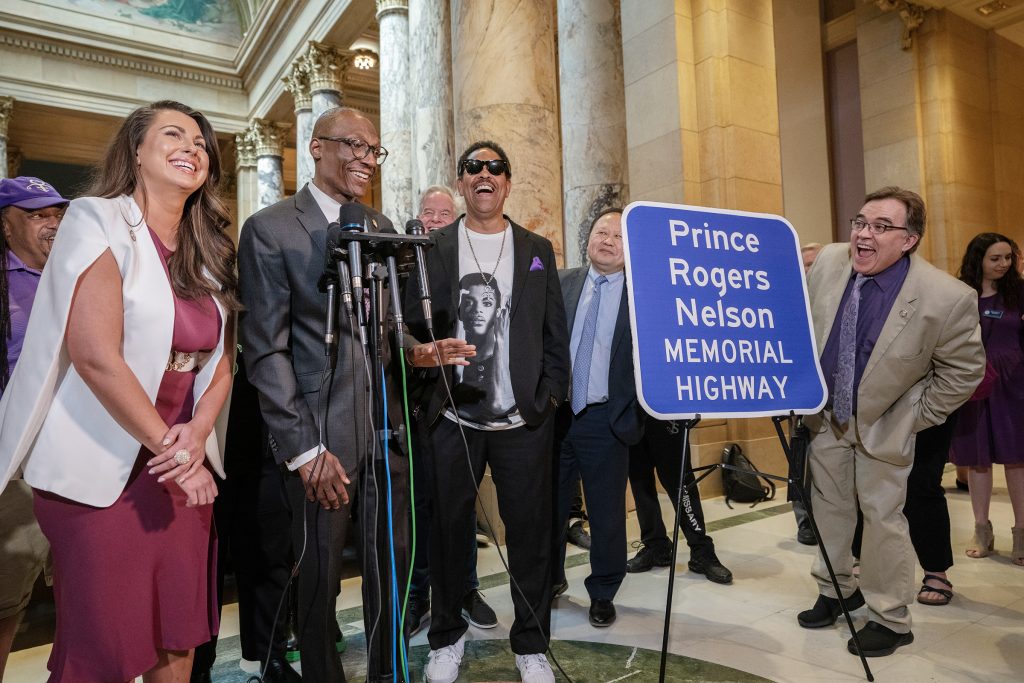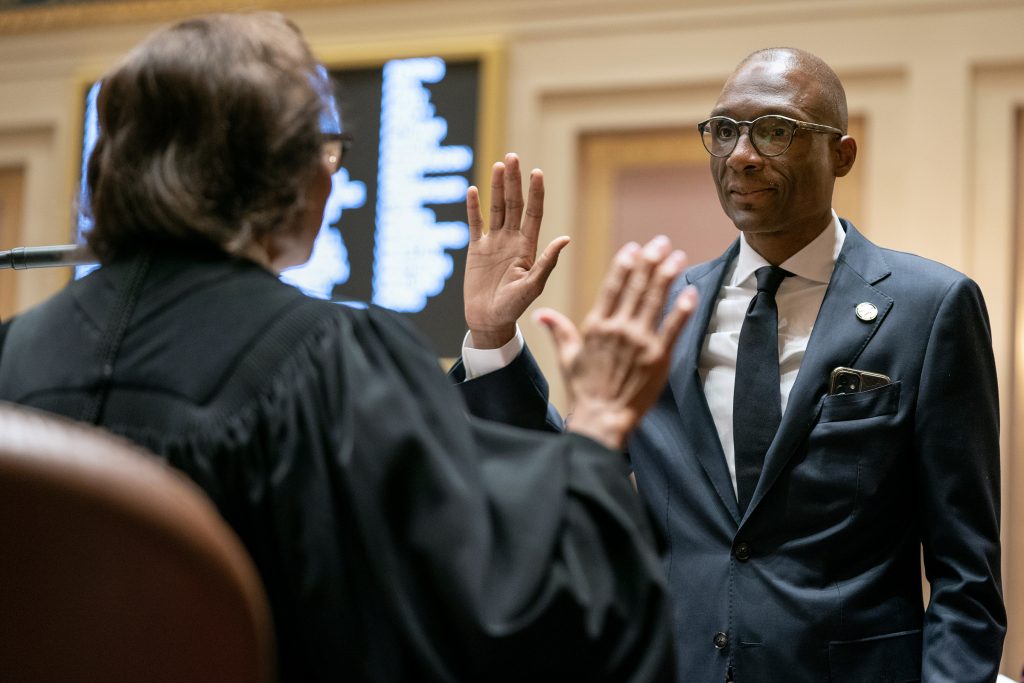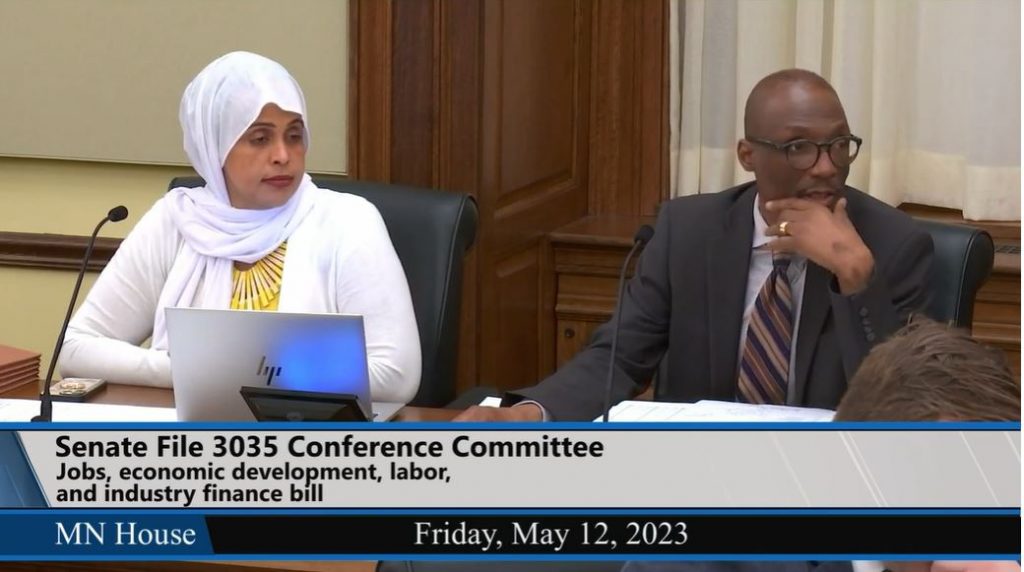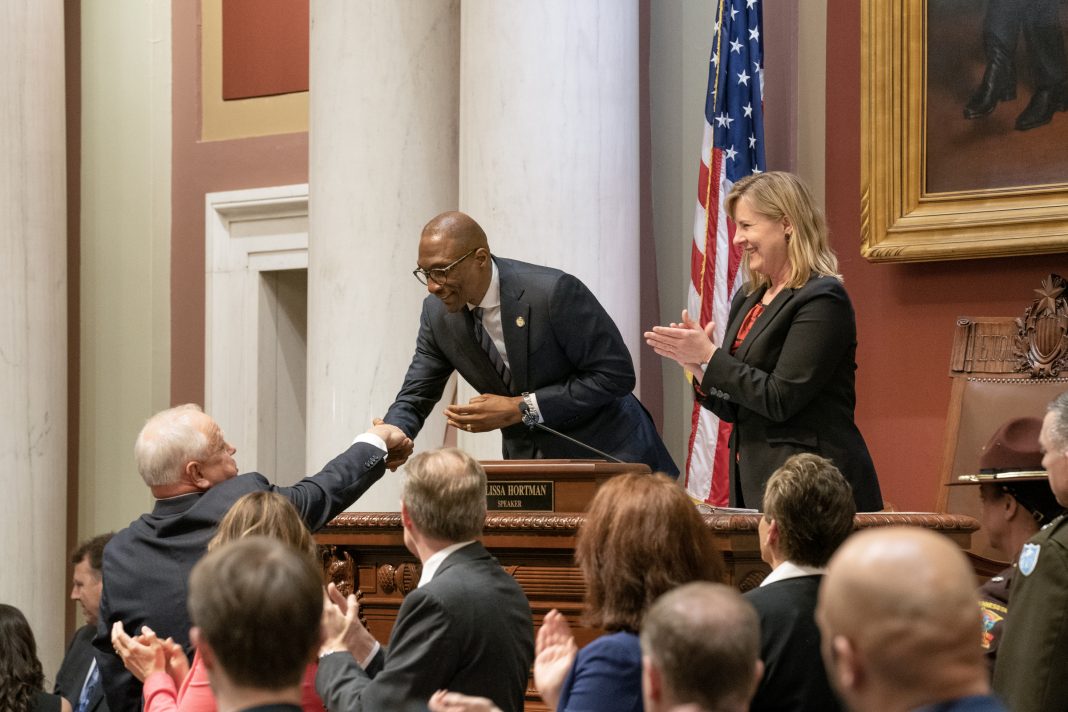
The moment when state Senator Bobby Joe Champion was sworn in as president of the Minnesota Senate on January 3, 2023 was historic, as he became the first Black person to assume the role in the state senate’s 165-year history.
The Minnesota Senate is the largest upper house of any state legislature in the country. His election as president came at a time of great prosperity for the state with a record budget surplus. It is common for Black people to be given opportunities to lead hallowed institutions when those institutions are in crisis or facing a severe downturn, a situation referred to as “glass cliff,” but rare for them to be given leadership roles in times of prosperity.
His ascendancy also came when the DFL controlled both houses at the legislature and the governorship (trifecta) for the first time since 2012. All constitutional offices (governor, lieutenant governor, attorney general, state auditor, and secretary of state), are also held by Democrats.
Sen. Champion early this week sat down for an interview with Mshale in the side of downtown Minneapolis that he represents in the senate.
The affable Sen. Champion says he is proud of the accomplishments he and his DFL colleagues achieved in the first session of the 93rd Legislature that concluded on the eve of the Memorial Day weekend, and that he looks forward to building on that record when the second session reconvenes in February.
“It was a great session for all of Minnesota and especially those historically marginalized,” the Minneapolis Democrat said. “We passed Restore the Vote, a monumental bill restoring voting rights for over 55,000 fellow Minnesotans who are no longer incarcerated but living among us and contributing to society. We also passed the Jobs and Economic Development budget bill that will support folks all across our great state no matter their zip code, whether they are in the metro or greater Minnesota. We made critical investments in childcare, workforce and economic development so we can build an economy that works for all Minnesotans. You know what? That Jobs and Economic Development bill also had the PROMISE Act which is a bill that I have been carrying for a while that will make our state more equitable for marginalized communities.”

The Jobs and Economic Development bill that Sen. Champion was referencing is a $1.37 billion investment in state spending that he was chief author of that focuses on bolstering workforce development and workplace safety across industries. Sen. Champion also pointed out that the bill Gov. Walz signed into law also includes over $350 million as a state match to compete for over a billion dollars in federal and private investment.
“We are moving our state toward exciting and innovative growth in our economy by approaching industrial policy with a strong focus on bringing new-generation technology into our state. We are positioning Minnesota to lead the nation in semiconductor innovation and bio industrial manufacturing,” said Sen. Champion.
“It’s a very time intensive job and there is nothing part-time about it,” he said when he was asked what he’d learned in the few months as senate president. “I had to do triple duty while our majority leader worked remotely as she recuperated as well as be president, and of course also fulfill my role as senator for my constituents.”
Three months into the legislative session in March, Senate Majority Leader Kari Dziedzic revealed she had been diagnosed with ovarian cancer and underwent successful surgery. Sen. Champion and Sen. John Marty of Roseville took over the in-person legislative work required. Sen. Dziedzic returned to the Senate floor on May 2, just three weeks to the end of session.
“It was not easy while she was gone but she did a great job remotely and we did what had to be done,” he said. “Sometimes there is no script, as life can throw you a curve ball, but we delivered for the people of Minnesota.”
“That required working with folks from the opposing party to deliver for Minnesotans,” he continued. “Many of the folks opposing Restore the Vote for example would acknowledge privately that it would benefit many of their own constituents in rural Minnesota. If you look at the $1.37 billion jobs and economic development bill, there is money there for every part of the state, so people would oppose it but I don’t think they are going to argue that it does not benefit those they represent, we are making investments for the future competitiveness of the state and you do that when you have a surplus like we had, by building for the future.”
Sen. Champion also said he was happy to be around to see the state elect Black women to the state Senate. Minnesota which had never elected a Black woman to serve in the state Senate, shattered that glass ceiling by electing three in one swoop in November, with one of them, Sen. Zaynab Mohamed, becoming the youngest woman ever to serve in that role.
He was full of praise for the trio of Black women senators, describing them as “hardworking and dedicated.” Sen. Champion said Sen. Mohamed approached him and offered to work on the difficult and challenging “Driver’s License for All” that Sen. Champion had chief authored.
“This was not an easy bill as you know it was a heavy lift but she (Sen. Mohamed) was willing to put in the work,” he said. “I was very impressed by that and I let her help me lead it through the Senate. This was a bill that was supported by law enforcement and a lot of folks in local government like the mayors throughout the state but had opposition from the other party. Well, it took many years but we passed the bill as you know and it will improve public safety across our state. Our Black women senators are off to a bright future representing their constituents, don’t forget one of them Sen. Oumou Verbeten co-authored the CROWN Act that the governor signed into law which bans racial discrimination based on natural hair and Sen. Maye Quade was co-author of the legislation that will now see the provision of free school lunch and breakfast to every student. They are working hard.”

The Senate president also touted the passage of legislation that the governor signed into law that makes Juneteenth a state holiday. In less than two weeks the state will commemorate the first Juneteenth as a state holiday.
“Great nations do not ignore their most painful moments, they face them. We took an important step as a state by deciding to make Juneteenth a state holiday so we can face the pain and suffering caused by the legacy of slavery and segregation. It acknowledges our nation’s struggle and recognizes the importance of forging our future together,” Sen. Champion said.
As the first Black Senate president, he said “I recognize the importance of the moment and I stand on the shoulders of many who sacrificed their lives so I can be in this position.”
Other issues that came up during the interview included the small number of Black legislators which the Senate president said needs to increase to better reflect the state’s demographics. The House and Senate combined has 10 Black legislators.

Sen. Champion was born in and raised in Minneapolis. He was first elected to the Minnesota House in 2008 where he served two terms and was elected to the Minnesota Senate in 2012 where he has served since. Trailblazing legislation such as Restore the Vote and Juneteenth is not the first time he has taken on thorny societal issues. Prior to becoming Senate president, Sen. Champion had earned accolades for one of his signature pieces of legislation, “Ban the Box” which went into effect on January 1, 2014. Ban the Box prevents most private employers from asking job applicants on their application if they have been previously convicted of a felony.
“We are here to work for all Minnesotans, no matter where you live, rich or poor,” Sen. Champion said.
About Tom Gitaa Gitaa, Editor-in-Chief
Born and raised in Kenya's coastal city of Mombasa, Tom is the Founder, Editor-in-Chief and Publisher of Mshale which has been reporting on the news and culture of African immigrants in the United States since 1995. He has a BA in Business from Metro State University and a Public Leadership Credential from Harvard’s Kennedy School of Government. He was the original host of Talking Drum, the signature current affairs show on the African Broadcasting Network (ABN-America), which was available nationwide in the United States via the Dish Network satellite service. On the show, he interviewed Nobel laureates such as 2004 Nobel Peace prize winner, Professor Wangari Maathai, the first woman from Africa to win the peace prize and heads of states. Tom has served and chaired various boards including Global Minnesota (formerly Minnesota International Center), the sixth largest World Affairs Council in the United States. He has previously served as the first Black President of the Board of Directors at Books for Africa. He also serves on the boards of New Vision Foundation and the Minnesota Multicultural Media Consortium. He has previously served two terms on the board of the United Nations Association. An avid runner, he retired from running full marathons after turning 50 and now only focuses on training for half marathons.
- Web |
- More Posts(455)








